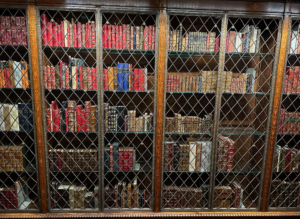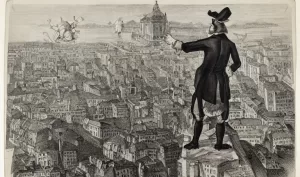Elizabeth Gilbert’s Top 13 Writing Tips
Millions of Americans read Elizabeth Gilbert’s blockbuster memoir Eat Pray Love. I was not one of them.
In fact, I grew a little sick of seeing it on bookstore shelves everywhere I went for three years. (It was on The New York Times bestseller list for a remarkable 187 weeks.) In the rarefied manner of a book snob, I assumed that Gilbert’s work must be meant for casual beach readers — not me.
And I was completely wrong. This year, I’ve become a huge Elizabeth Gilbert fan. I’ve watched her TED talks and just finished reading her book about creativity, Big Magic, in which she pulls back the covers on her creative process and encourages every reader to find their own creative magic.
Here are the top 13 lessons I learned from Gilbert’s Big Magic:
1. Embrace your status as a creator
“The guardians of high culture will try to convince you that the arts belong only to a chosen few, but they are wrong…We are all the chosen few. We are all makers by design.” -Elizabeth Gilbert
The best-kept secret in the world? EVERYONE is a creator. Whether it’s writing poetry, making balloon animals for children, or building beautiful birdhouses, every human was born to be creative.
I grew up thinking I wasn’t a creative person. I thought my brother Trevor inherited the creative genes of the family. After all, he was the musician — the “right-brained” one — while I was the analytical “left-brained” child.
I believed that lie until age 26, when I discovered my creativity in an unusual location: Corporate America. When I became a product manager of a software company, I got the chance to build “mock-ups” of user interface design. I fell in love with the feeling of creating something, and I felt like a creative person for the first time in my life.
You were born to create things. I don’t know what that thing is (and maybe you don’t yet either), but you were BORN TO CREATE. Don’t hold back.
2. Unearth the treasure within you
“So this, I believe, is the central question upon which all creative living hinges: Do you have the courage to bring forth the treasures that are hidden within you?” -Elizabeth Gilbert
Not only is every person made to create, but every person has been given the raw materials to create what they need to build.
For years, I thought to myself, “I’ll write when I have something to say. Maybe when I’m 50 and I’ve had a great business career, I can write what I learned about leadership.” I didn’t think I had the raw materials to get started, so what did I do? Nothing. I didn’t write a damn thing.
Then I realized that often in conversations with colleagues, people would find value in the things I had to say. I began to wonder, If there’s value in what I have to say, wouldn’t there be value in the things I have to write? (Answer: yes.)
You may be like me…waiting to begin writing until “later.” Stop kidding yourself. Everyone has something to say. As the great Flannery O’Connor said, “Anybody who has survived his childhood has enough information about life to last him the rest of his days.”
3. Work like a farmer
“Most of my writing life consists of nothing more than unglamorous, disciplined labor. I sit at my desk and I work like a farmer, and that’s how it gets done. Most of it is not fairy dust in the least.” -Elizabeth Gilbert
Another pernicious lie about creative work is that creativity is all about flashes of brilliance: either you have them or you don’t. Gilbert says that’s bullshit. The majority of creative work feels like a slog. Ideas often flow like syrup, not a rushing river.
I encourage you to accept two seemingly opposing ideas:
- You are born to create.
- Your creative work will often not feel “natural.” It will be very difficult.
While you’re writing, you often will not FEEL like a writer. You may spend 30 minutes on a single sentence. (I sure have.) Your work will require immense amounts of patience and endurance. But that doesn’t mean you’re “not the creative type.”
4. Be brave
“Do you have the courage? Do you have the courage to bring forth this work? The treasures that are hidden inside you are hoping you will say yes.” -Jack Gilbert
Elizabeth Gilbert opens Big Magic by talking about one of her heroes: a man named Jack Gilbert (no relation). She first heard about Jack when she became a writing professor at the University of Tennessee, upon which she learned that the last person in her teaching role at the college shared her last name.
Students regaled her with stories about Jack, and Elizabeth realized that they loved Jack because he not only taught them how to write, but he taught them how to be brave. “Without bravery, he instructed, they would never be able to realize the vaulting scope of their own capacities,” writes Elizabeth. “Without bravery, their lives would remain small — far smaller than they probably wanted their lives to be.”
Although Jack passed away in 2012 and Elizabeth never ended up meeting him, Jack’s words live on through his students and now through her.
5. Take classes from dead teachers
“Do you want to study under the great teachers? Is that it? Well, you can find them anywhere. They live on the shelves of your library; they live on the walls of museums; they live in recordings made decades ago. Your teachers don’t even need to be alive to educate you masterfully.” -Elizabeth Gilbert
Gilbert says she learned more about plotting and characterization from Charles Dickens than from any living writer. “All I had to do in order to learn from Dickens was to spend years privately studying his novels like they were holy scripture, and then to practice like the devil on my own,” says Gilbert.
She says no one needs a Master of Fine Arts degree (MFA) to write. All you need is to read a lot and write a lot. Reading the work of talented authors fills you with words that will mysteriously ooze out of you at the right moment.
Learn from the best writers in the world. You can find them on the shelves of your library or bookstore. A $20 book can sometimes take you further than a $5,000 class.
6. Keep a “second notebook”
“Here’s what I did during my twenties, rather than going to school for writing: I got a job as a waitress at a diner…Working at the diner was great, because I had access to dozens of different voices a day. I kept two notebooks in my back pockets — one for my customers’ orders, and the other for my customers’ dialogue.” -Elizabeth Gilbert
Gilbert is quick to say that she has nothing against education. She thinks graduate writing programs can be a great place to learn, depending upon the person and the situation.
But for her own life, Gilbert made the decision to learn from working and traveling rather than paying big bucks to enroll in a fancy graduate program. While she was waitressing, she took notes on the interesting people that came through her restaurant. Those notes became fodder for stories, characters, and ideas that would later splash the pages of her books.
Regardless of your situation, you are surrounded by potential writing material. Overheard dialogue. Fascinating relatives. Remarkable stories you stumble across in books, podcasts, and news articles. You need to record those insights. Whether you use a notebook, a commonplace book, or a digital tool like Evernote, don’t let good material go to waste.
7. Become a time scavenger
“People don’t do this kind of thing because they have all kinds of extra time and energy for it; they do this kind of thing because their creativity matters to them enough that they are willing to make all kinds of extra sacrifices for it. Unless you come from landed gentry, that’s what everyone does.” -Elizabeth Gilbert
I used to tell myself that I would write later — when I “had the time” to do it. In my fantasy world, someday I wouldn’t need another job and I would be able to read and write all day. (Sounds great, doesn’t it?)
Alas, I haven’t discovered that fantasy world yet. So instead I’ve opted for the alternative: I make time to write. Yup. Even though I’m often exhausted at the end of my workday, I spend most of my free time reading and writing.
“For most of human history, then, the vast majority of people have made their art in stolen moments, using scraps of borrowed time,” writes Gilbert. Even Gilbert didn’t quit her day job until after she had published three books with major publishing houses — including a National Book Award nominee.
If you want to give this whole creative thing a shot, you’re going to need to get scrappy. You will need to become a time scavenger and a ruthless prioritizer.
8. Treat writing like a love affair
“[Lovers] will make whatever sacrifices they have to make, and they will blast through any obstacles, in order to be alone with the object of their devotion and obsession — because it matters to them.” -Elizabeth Gilbert
Gilbert encourages readers to “fall in love with your creativity” and steal away for small increments of time, like a lover in an extramarital affair.
If you truly love something, you’ll make time for it. Writing should be no different. It will (almost) never be easy to find time to write, but it will always be worthwhile.
Write because you love it. That’s the only good reason there is.
9. Don’t let lack of inspiration slow you down
“I work either way, you see — assisted or unassisted — because that is what you must do in order to live a fully creative life. I work steadily, and I always thank the process. Whether I am touched by grace or not, I thank creativity for allowing me to engage with it at all. Because either way, it’s all kind of amazing — what we get to do, what we get to attempt, what we sometimes get to commune with.” -Elizabeth Gilbert
Gilbert believes there is indeed an external creative force that sometimes bestows inspiration upon writers. She says it goes by many names: daemon (what the ancient Romans called it), genius, inspiration, Big Magic, the Muse, etc.
But as much as every writer loves long visits from the Muse, those visits are infrequent. They are the exception rather than the norm. Write anyway.
10. Become a deeply disciplined half-ass
“The great American novelist Robert Stone once joked that he possessed the two worst qualities imaginable in a writer: He was lazy, and he was a perfectionist. Indeed, those are the essential ingredients for torpor and misery, right there. If you want to live a contented creative life, you do not want to cultivate either one of those traits, trust me. What you want is to cultivate quite the opposite: You must learn how to become a deeply disciplined half-ass.” -Elizabeth Gilbert
Perfectionism will torpedo a creative career faster than almost anything else.
You need to find the line between what is good enough and what is not. Yes, you must edit all of your work, and often you should encourage others to edit it as well. Gilbert is not advocating for sloppiness. She’s advocating for shipping your work. There is a difference.
Acknowledge right now that your work will never be perfect. Don’t get caught in the perfectionistic hamster wheel of never thinking something is good enough. Write the best piece you can. Then edit it, preferably several times. Then ship it. Then do it all over again. Become known as a writer of consistent high quality, not inconsistent perfectionism.
11. Endure the rough times
“[L]earning how to endure your disappointment and frustration is part of the job of a creative person…Frustration is not an interruption of your process; frustration is the process.” -Elizabeth Gilbert
Just like any worthwhile pursuit, writing will beat you up. Skateboarders skin their knees. Basketball players sprain their ankles. Creative professionals bruise their egos.
“You don’t just get to leap from bright moment to bright moment,” writes Gilbert. “How you manage yourself between those bright moments, when things aren’t going so great, is a measure of how devoted you are to your vocation, and how equipped you are for the weird demands of creative living. Holding yourself together through all the phases of creation is where the real work lies.”
Prepare for a difficult road ahead. No, it’s not going to be easy, but it will be rewarding.
12. Exercise artistic defiance
“I sent more and more work out. I was rejected, rejected, rejected, rejected. I disliked the rejection letters. Who wouldn’t? But I took the long view: My intention was to spend my entire life in communion with writing, period…editors could reject me all they wanted; I wasn’t going anywhere.” -Elizabeth Gilbert
Rejection is inevitable. If great writers like Elizabeth Gilbert, Stephen King, and Neil Gaiman experienced rejection, so will we. But failure is not fatal. We can either allow rejection to gash a hole in the side of our boat or use it to blow air in our sails.
Elizabeth Gilbert chose the latter: “I decided to play the game of rejection letters as if it were a great cosmic tennis match: Somebody would send me a rejection, and I would knock it right back over the net, sending out another query that same afternoon. My policy was: You hit it to me, I’m going to hit it straight back out into the universe.”
Opt for the path of artistic defiance. Not only will that path keep you writing, but it will be a hell of a lot more fun than wallowing in misery.
13. Unleash your big magic upon the world
“Anyhow, what else are you going to do with your time here on earth — not make things? Not do interesting stuff? Not follow your love and your curiosity?” -Elizabeth Gilbert
Creating art of any form is one of the noblest pursuits in the world. It’s an opportunity to shine a flashlight upon the creative recesses inside yourself that you never knew were there. And maybe, just maybe, by releasing your art into the world, you can inspire someone else to pull out their flashlight too.
You have magic inside you. And yes, the process of mining that magic will require intense discipline, hours of toil, ego-bruising failure, and boundless bravery. But I know you’re up for the challenge. I’m excited to see what you create.
If you enjoyed this article, please support Elizabeth Gilbert by reading Big Magic or one of her many other books.
Happy writing!




